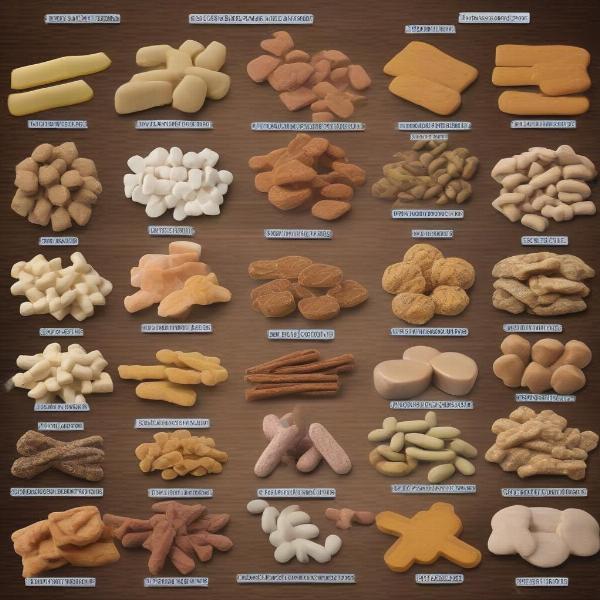Vet dog treats are specially formulated treats designed to support a dog’s health while also providing a tasty reward. They often address specific health concerns like joint health, dental hygiene, or skin and coat health. Understanding the benefits and considerations when choosing vet dog treats is essential for responsible pet ownership. This guide will explore everything you need to know about vet dog treats, from choosing the right treat for your dog’s needs to understanding the ingredients and potential benefits.
Choosing the Right Vet Dog Treats for Your Canine Companion
Selecting the appropriate vet dog treats requires careful consideration of your dog’s individual needs. Factors like age, breed, size, and any existing health conditions should influence your choice. For example, a senior dog with joint issues might benefit from treats containing glucosamine and chondroitin, while a puppy needs treats that are small, soft, and easily digestible. Always consult with your veterinarian to ensure the treats align with your dog’s overall health plan. They can provide personalized recommendations based on your dog’s specific requirements.
Understanding the Ingredients in Vet Dog Treats
Just like human food, the ingredients in vet dog treats are crucial. Look for treats made with high-quality, natural ingredients, and avoid those containing artificial colors, flavors, and preservatives. Prioritize treats with a clear list of ingredients, making it easy to identify potential allergens or ingredients your dog might be sensitive to. america’s vet dog treats are a popular choice, known for their focus on natural ingredients.
 Hình ảnh nhãn thành phần của bánh thưởng cho chó
Hình ảnh nhãn thành phần của bánh thưởng cho chó
The Benefits of Vet Dog Treats
Vet dog treats offer numerous benefits beyond simply rewarding good behavior. They can support specific health needs, such as improving dental health, promoting healthy skin and coat, and supporting joint function. Some treats are even designed to aid in weight management or provide additional nutritional support for dogs with specific dietary restrictions. Always remember that vet dog treats should complement a balanced diet and not replace regular meals.
Common Types of Vet Dog Treats
Vet dog treats come in a variety of forms, from crunchy biscuits and dental chews to soft treats and freeze-dried options. Dental chews can help remove plaque and tartar buildup, while soft treats are ideal for senior dogs or those with dental issues. Freeze-dried treats often retain more nutrients and flavor compared to other processed options. gummy hot dogs are not vet-recommended treats and should be avoided.
Vet Dog Treats for Specific Health Concerns
If your dog has specific health concerns, like allergies, digestive issues, or mobility problems, choosing vet-approved treats can be especially beneficial. cut on dogs paw requires immediate veterinary attention and not related to treats. Look for treats formulated to address these specific needs, such as hypoallergenic treats for dogs with allergies or low-fat treats for overweight dogs. Always consult your vet before introducing new treats, especially if your dog has pre-existing health conditions. dog car lead can be useful for car trips.
Conclusion
Vet dog treats can be a valuable addition to your dog’s health and well-being when chosen carefully and used appropriately. Remember to prioritize high-quality ingredients, consider your dog’s individual needs, and consult your veterinarian for personalized recommendations. By making informed choices, you can ensure your furry friend enjoys the benefits of these specialized treats while staying healthy and happy.
FAQ
- Are vet dog treats necessary? While not strictly necessary, vet dog treats can offer significant health benefits and provide a healthy and rewarding way to reinforce positive behavior.
- How many vet dog treats should I give my dog daily? Follow the recommended serving size on the packaging and consider your dog’s overall calorie intake. Treats should not make up more than 10% of your dog’s daily calories.
- Can I give vet dog treats to puppies? Yes, but choose treats specifically formulated for puppies, which are typically smaller and softer. america’s vet dogs treats might have options for puppies.
- What should I do if my dog has an adverse reaction to a vet dog treat? Stop giving the treat immediately and consult your veterinarian.
- Are all vet dog treats expensive? No, prices vary depending on the brand, ingredients, and type of treat.
About ILM Dog
ILM Dog is your trusted resource for expert dog care advice, offering guidance on everything from breed selection and training to nutrition and healthcare. We cover various topics, including dog breeds, health, training, nutrition, grooming, accessories, and more. For personalized advice or more information, contact us via email at [email protected] or phone at +44 20-3965-8624. We aim to empower dog owners with the knowledge and resources they need to provide the best possible care for their canine companions.